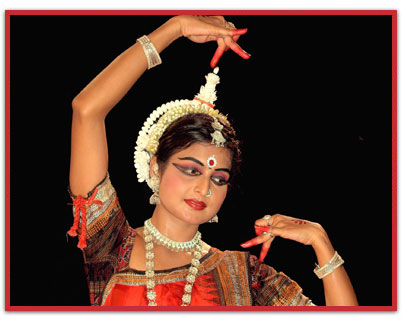Odissi Classical Dance
 In Orrisa Odissi is the traditional dance and probably owes its origin to the temple dances of the 'Devadasis'. The Odissi dancers use their head, bust and torso in soft flowing movements to express specific moods and emotions.
In Orrisa Odissi is the traditional dance and probably owes its origin to the temple dances of the 'Devadasis'. The Odissi dancers use their head, bust and torso in soft flowing movements to express specific moods and emotions.The history of Odissi dates back to somewhere between the 8th and the 11th century, when the kings took great pride in excelling in the arts of dance and music.Jayadeva's "Geeta-Govinda", the Bible of an Odissi dancer, written in the 12th century, has stupendous influence on the arts of Orissa.
Odissi performances are replete with lores of the eighth incarnation of Vishnu, Lord Krishna. It is a soft, lyrical classical dance which depicts the ambience of Orissa and the philosophy of its most popular deity, Lord Jagannath, whose temple is in Puri.
Odissi technique is based on the "Chowka", a manly posture, and the weight of the body is distributed equally on both the sides. About Odissi interesting is that body position is not merely a part of the vocabulary or framework.
Odissi dancer costume is a silk saree draped in a practical and comfortable style. Wears on the head ornament called the "Mathami", on ears "Kapa", on wrists "Kankana"
Today Odissi is a well established and codified classical dance form of India.
Folk Dances of India 

